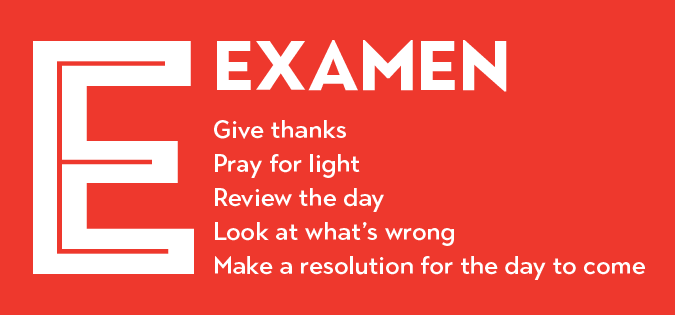Examen for Life During COVID-19 | Ignatian Solidarity Network
The Examen is a traditional method of prayerful awareness that is a bedrock in Ignatian spirituality and Jesuit education. It’s a short, easy way to reflect on your day and become more mindful about where you are experiencing grace or goodness and where there is room in your actions and life for growth. Especially in times of uncertainty and rapid change, taking time to reflect becomes essential.
What people don’t often realize is that the Examen is exceptionally flexible and adaptive. It can be used to review your day or it can be adapted to hone in on a specific issue or focus. So in light of the new set of circumstances many of us find ourselves in with COVID-19, it is helpful to adapt the Examen to this unique situation.
Take a moment to settle. Take a deep breath. Get comfortable. Like a rock settling on the bottom of a lake after it’s thrown in, let yourself settle.
- Acknowledge how you are feeling in this moment. If being calm is hard, acknowledge it. If you find yourself frustrated or stressed, acknowledge it. God wants to be present in all parts of our lives—not just the easy or serene moments.
- Ask for light and insight as you prepare to review your day. For some that light may come in the form of a sense of the Divine. For others it’s from a deep sense of your true self.
- Take a moment to think about how COVID-19 has impacted your life. Even as we are being asked to distance ourselves from one another socially, ask yourself what connections you find yourself grateful for?
Who makes you feel grounded and connected to God?
- Public health issues have a way of making us recognize how interwoven our lives are with others in society. It can help us realize who we may often choose not to see or connect with.Is there a person or group of people especially affected by COVID-19 that you don’t often choose to see or connect with normally? What connections to others are you becoming more aware of?Who do you normally choose to reach out and connect to? Who do you avoid or refuse to see? If you can, picture the faces of these people.What connections do you take for granted in your life? What connections impact you the most?
- Note the emotions you feel when you think of these individuals without judging or overanalyzing. Simply acknowledge them, pay attention, and listen to where God may be speaking.
- As you think of the ways we are connected or disconnected to one
another, pick a connection (or lack thereof) that seems important,
significant, or is manifesting itself the strongest. Pause and reflect
on where you’re being invited to grow from that moment. If you are a
person of faith, take a moment to pray with it.
- God gifted us with limitless creativity and imagination. Even in this time of separation and possible isolation, what is one way you can maintain meaningful connection to others—whether directly, through technology, or intentional focus and attention?
Take a deep breath and moment of quiet. When you are ready, return to your day.
Susan Haarman is the associate director at Loyola University Chicago’s Center for Experiential Learning, facilitating faculty development and the service-learning program.

No comments:
Post a Comment